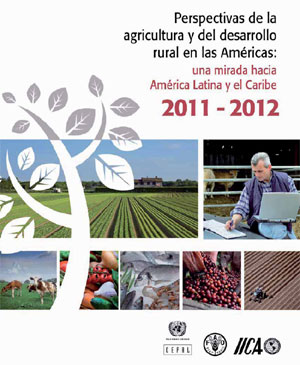The Region Must Close Technology Gaps to Increase Food Production
Work area(s)
Three institutions presented a joint report on the status of and outlook for agriculture in Latin America and the Caribbean.

(21 October 2011) Despite the current context of volatility and high food prices, in the long term, the agricultural sector in Latin America and the Caribbean (LAC) will be able to take advantage of the opportunities afforded by having available land - albeit concentrated in a few countries- a relative abundance of water, biodiversity and well-educated human resources.
But this will require more than simply increasing the area under cultivation. It will also be necessary to bridge the gaps in technology and production in the region, in order to significantly increase yields and food production, according to ECLAC, FAO and IICA.
These three institutions presented a joint report entitled The Outlook for Agriculture and Rural Development in the Americas: A perspective on Latin America and the Caribbean 2011-2012 to the Ministers of Agriculture of the Americas, at a meeting held on October 21 in San Jose, Costa Rica.
The Director General of the Inter-American Institute for Cooperation on Agriculture (IICA), Victor M. Villalobos, pointed out that "the recommendations contained in the report coincide with the discussions held here by the ministers, which focus on the need to invest in agriculture in order to make agriculture the driving force of development."
According to Jose Graziano da Silva, Regional Representative and Director General-elect of the United Nations Food and Agriculture Organization (FAO), "The region must take advantage of high food prices to distribute the rewards of growth more equitably, encouraging production by those engaged in family agriculture and facilitating their access to natural and financial resources and markets."
In the view of the Executive Secretary of the Economic Commission for Latin America and the Caribbean (ECLAC), Alicia Bárcena, more innovation is required to meet the challenges that climate change imposes on agriculture and to ensure that agricultural practices respect the natural balance that will ensure our survival as a society." Bárcena also emphasized that, "innovation is fundamental for moving toward a low carbon agriculture."
Agricultural production in LAC was higher in 2010 than in 2009, with cereals performing best, up more than 7% over 2009. However, growth was not uniform throughout the region. While agriculture in the Southern Cone, which exports grains and oilseeds, grew at more than 4.5%, the rate in the other sub-regions of LAC did not exceed 2.5%.
According to the report, volatility and high food prices will continue in the short and medium terms.
In 2011, agricultural production is expected to increase thanks to the favorable outlook for the prices of the major agricultural commodities. However, policies are still needed to ensure improved performance in agriculture in the long term, especially those that promote innovation and adaptation to climate change.
Any queries should be addressed to the ECLAC Public Information and Web Services Section. E-mail: dpisantiago@cepal.org; Telephone: (56 2) 210 2040.
Country(ies)
- Latin America and the Caribbean
Contact
Public Information Unit
- prensa@cepal.org
- (56 2) 2210 2040